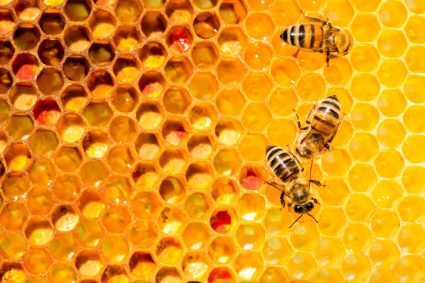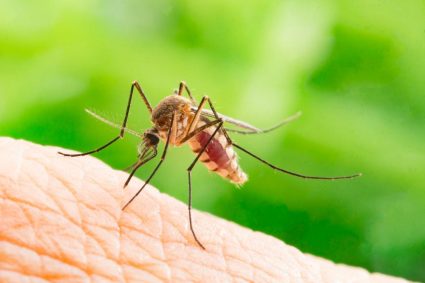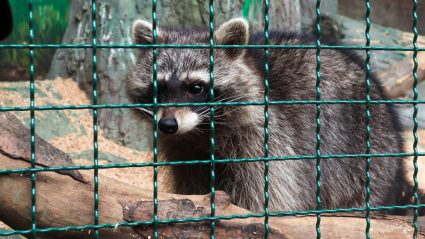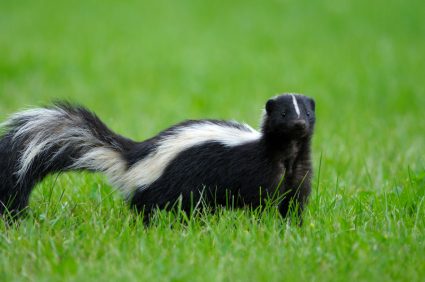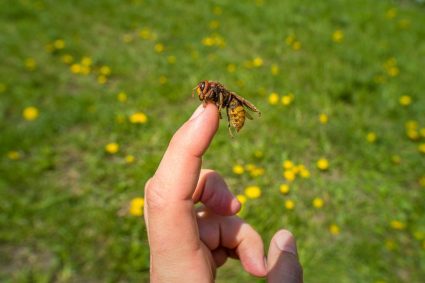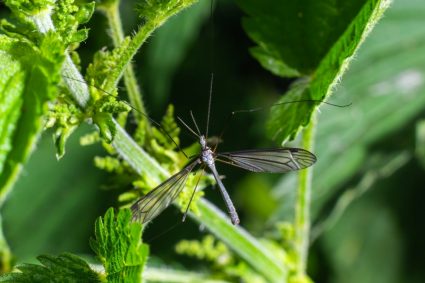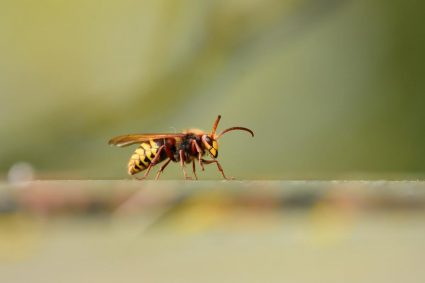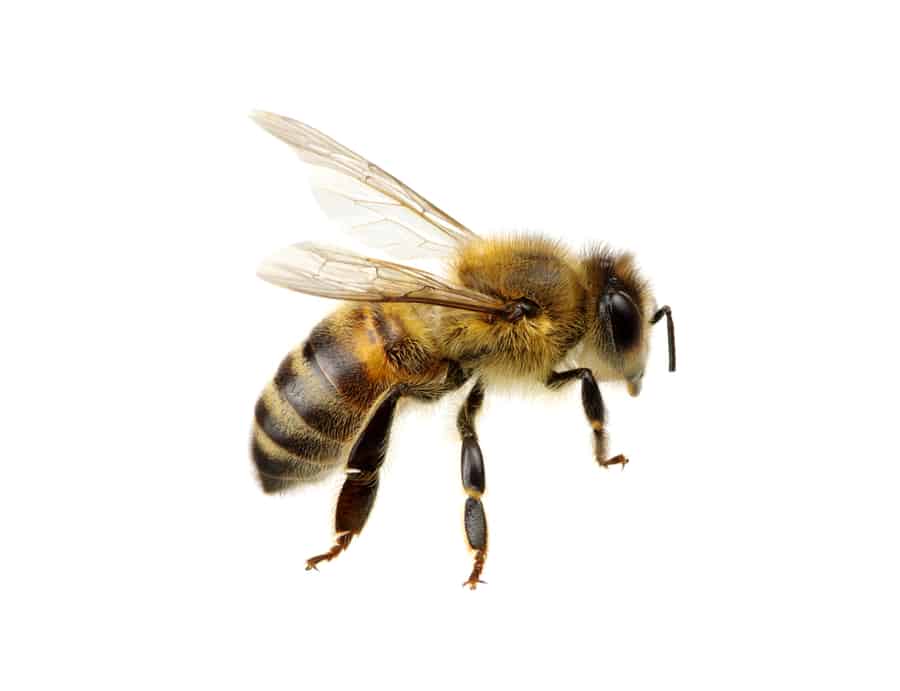
Have you ever been stung by a bee or wasp? If yes, the sting is certainly something you would not want to experience again. If you haven’t, you should not experience it at all.
The funny thing is that you may be unable to differentiate a bee sting from a wasp’s. Both look alike, make similar buzzing sounds, and give painful stings.
If you notice their activities in your home or environment, we have some deterrent strategies to help frighten them away.
In your war against wasps and bees, below are some ways to keep them away:
- Deter them with plants/herbs.
- Seal all potential entry points for these pests.
- Call an exterminator.
These deterrent strategies will work for both wasp and bee infestations. However, we distinguished between both infestations in the guide.
The sections below will discuss six ways to keep bees away and another eight ways to deter wasps.
After that, we will briefly differentiate between the two insects to ensure you apply the right deterrent strategy in your war against them.
To wrap it up, we will answer some common queries about dealing with the infestation of these stinging pests.
6 Ways To Keep Bees Away
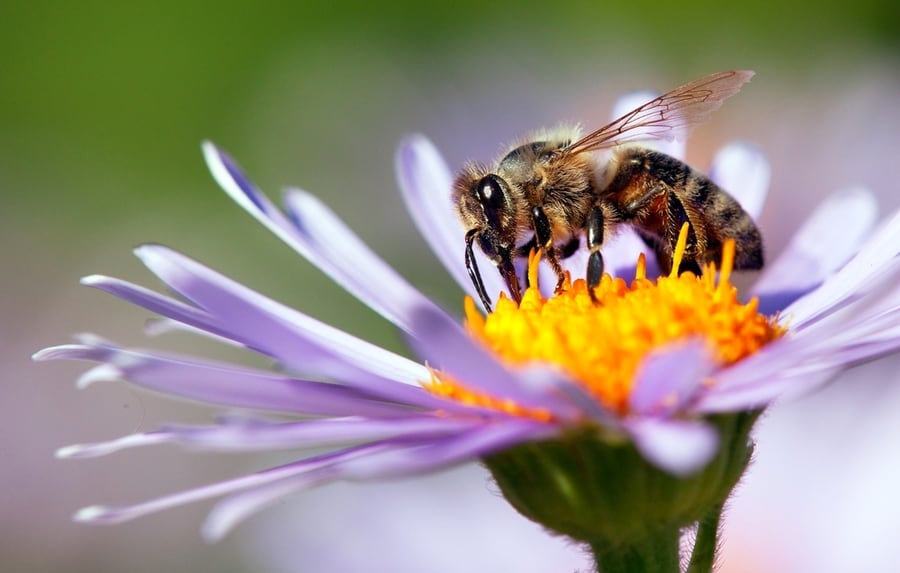
There are various species of bees, and these different species act differently.
European honey bees are primarily for honey production and pollination. Bumble bees are hairier and rarely produce honey.
Africanized killer bees are more aggressive than honey bees, while carpenter bees can bite through woods.
All these bee species share one thing in common – they all sting.
You can keep them away by using any of the strategies below:
1. Use Plants/Herbs
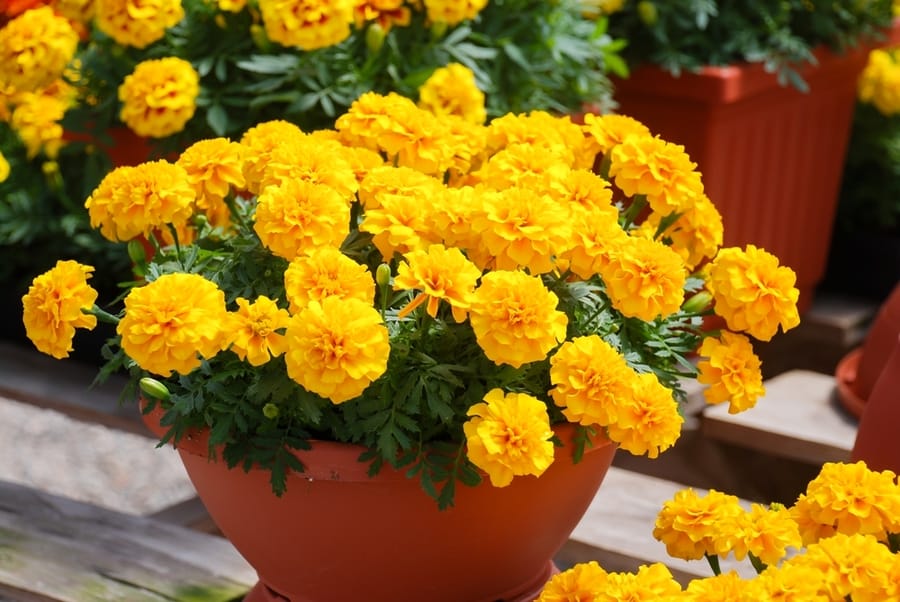
There are some plants and herbs that deter bees. They include peppermint, cucumbers, cinnamon, clove, garlic, marigold, and basil.
It is not safe to assume that similar plants would repel bees because they like some plants too. It is best to avoid plants like lavender and snapdragon since they attract bees.
The other plants/herbs mentioned earlier choke bees and make them uncomfortable. Cucumbers particularly frighten bees and discourage them from coming close.
So, how do you use these natural repellants?
You can plant them in small pots and keep them around choice areas. If it is your yard that you are protecting them from, you can create a mini garden and plant these herbs.
Having these herbs around your yard is also great if you stay in an area where bees are common. Since you will be staying around such areas ( e.g., Southern Florida) for some time, having those herbs in your garden will help.
The same goes for your pool, deck, and patio. You can plant cucumbers, marigolds, and peppermints in pots and keep them there.
You can also place some cinnamon, garlic, and cucumber peels around the edges of your deck or pool.
2. Intentionally Avoid Bee-Infested Areas

You can research various locations before embarking on a picnic, camp, or road trip.
Closing your eyes to a possible bee attack because you want to have the time of your life isn’t the best.
Even if there is a particular spot you want to check out, please remind yourself of the dangers of a bee sting.
Also, remember that nothing is worth sacrificing your health or your family’s safety.
3. Avoid Strong Scents
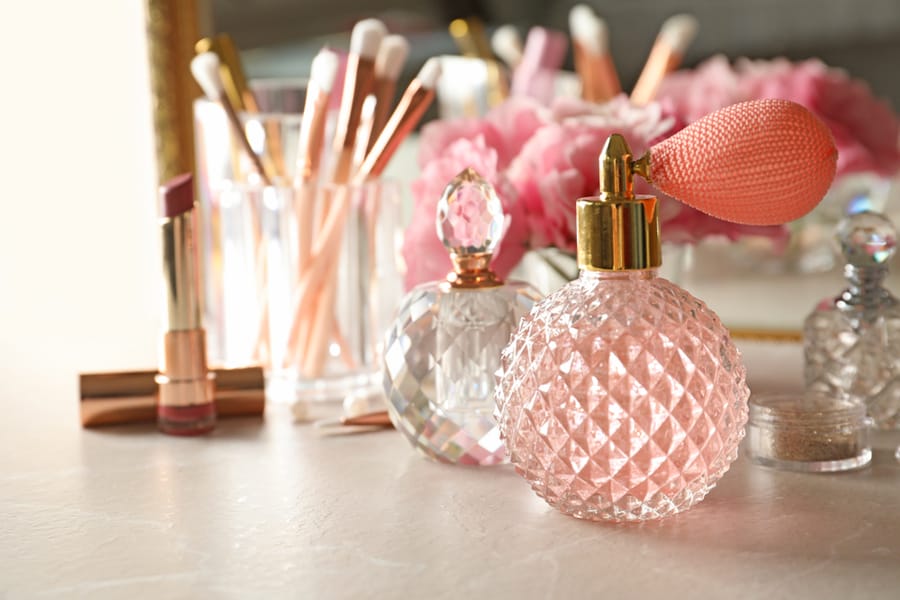
Bees do not care if it is your favorite color or dish – they will come knocking at your home when they smell anything pleasant.
Since they feed on nectar, they are already used to the scent of flowers and can detect similar odors.
They also have a thing for juicy fruits and sweet-smelling plants. If you are planning a picnic, it is better to prepare the food before heading out.
You can also pack the food in air-tight flasks to keep bees at bay. The same approach will work for grills and barbecues. It may seem like there is no fun in all that, but there is also no fun yelling from a bee sting.
Your perfume/cologne is another thing you must consider if trying to keep bees away. Wear scentless perfume or spray to be on the safe side.
If you must use perfumes with strong scents, you may need to wait to get to a place with fewer or no bees.
4. Spray a Soap Solution
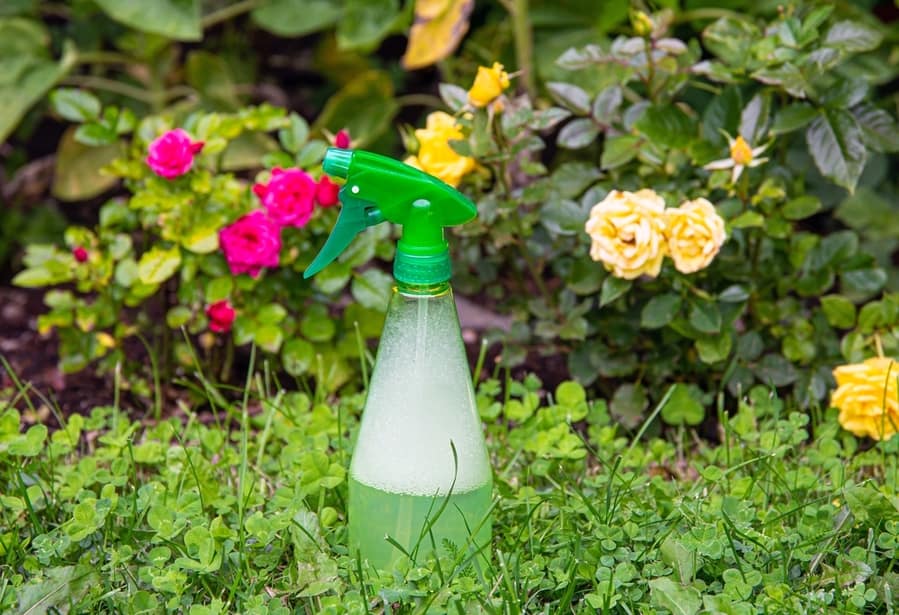
Sprinkling soap and water is an excellent way to keep bees away. The chemicals in the soap wash off their outer skin and kill them instantly.
You can sprinkle the soap and water solution around their hive to remove them. Many will drown in the solution with no chance to fight back.
Remember not to stay too close when applying the solution. It is best to deploy this strategy at night when the bees sleep.
Whichever time you choose, pour the mixture into their nests and return to dispose of the bee remains some minutes after.
5. Avoid Brightly-Colored Clothes
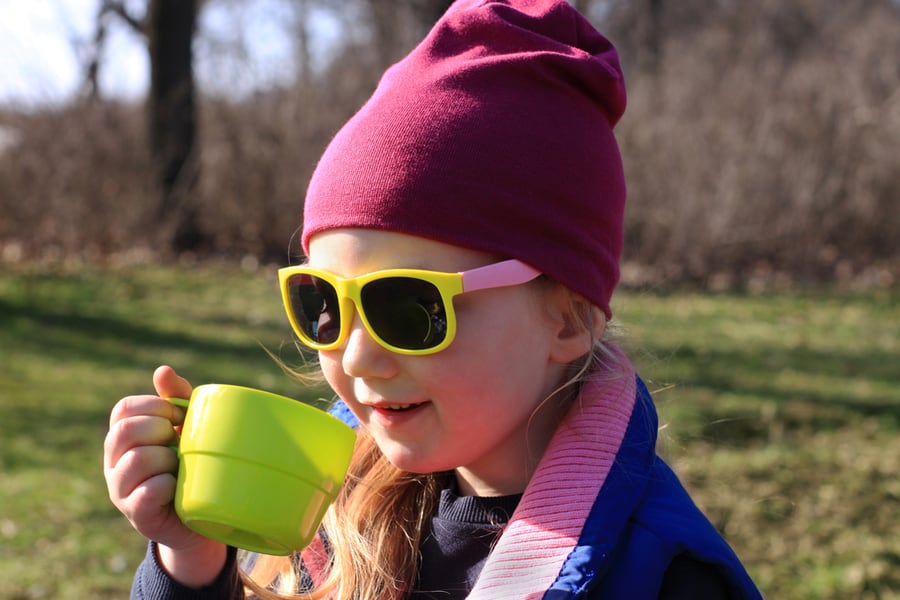
If you would be hiking or exploring the woods often, you should wear only plain-colored shorts.
Bees will come towards a bright-colored or floral design out of curiosity, and you surely don’t want to be in the way.
Yellow, orange, purple, and blue are colors that attract bees, while white does not get their attention.
You can stick to white polos if you are not trying to get attention from them.
6. Try Vinegar and Vanilla
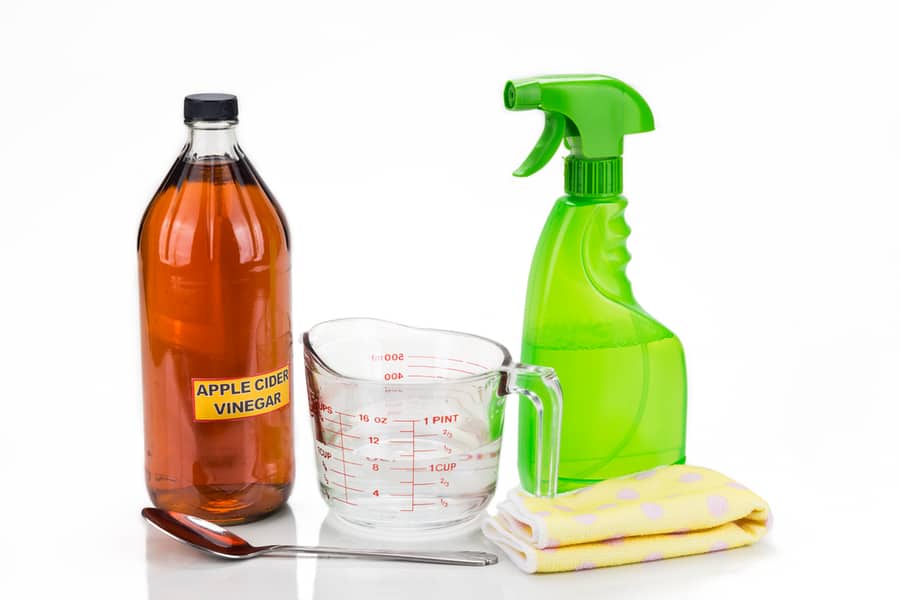
Vinegar and vanilla are powerful bee repellants. You can mix white or apple cider vinegar with water and put it in a spray can. Spray the mixture around your house and around beehives to weaken the bees.
Vanilla extract is another strong bee repellent because they hate its smell. You can sprinkle some vanilla extract if you have flowers in your garden.
The scent of vanilla will annoy them and keep them away. They will not also notice the smell of the flowers because the vanilla smell is thicker.
8 Ways To Keep Wasps Away
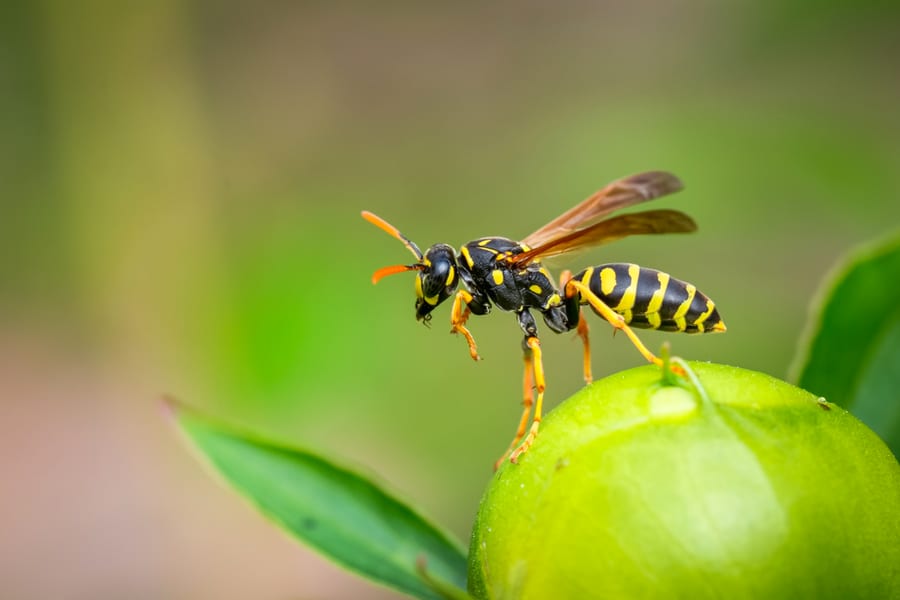
Unlike bees which are primarily attracted to plants and flower nectar, wasps are attracted to foods, sugars, and drinks. They also feed on plants, but they are mostly food fans.
Bees and wasps are so similar that most things that repel bees also repel wasps. Soap and water are one mixture that repels both of them. Some plants like cloves and garlic repel them too.
Below, we will consider other methods you can deploy to keep wasps away:
1. Apply Essential Oils
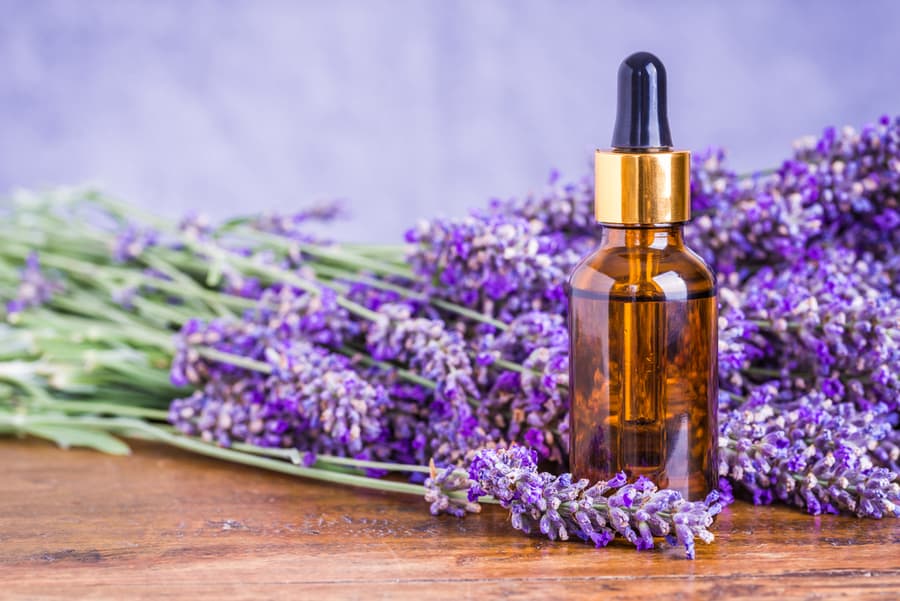
Remember that bees love the smell of lavender. Well, it is the opposite for wasps. Lavender oil, peppermint oil, and eucalyptus oil are enemies of wasps, and they chase them away.
You can mix these oils with water in a spray can. Afterward, spray around your deck, patio, or any other area you have noticed wasps activities to ward them off.
You can also put large quantities of these oils around their nests and leave them for a while.
Another way to use essential oil is by applying them on a dry cloth or cotton wool and placing them strategically.
2. Switch Off Unnecessary Lights
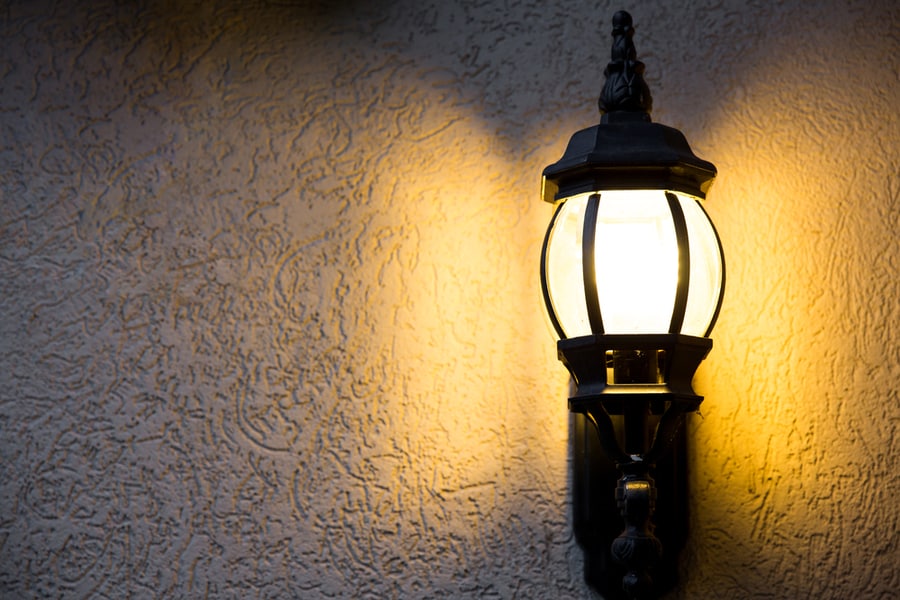
Wasps get excited around bright lights, so you may want to switch off some lights when they are not in use. These lights keep them warm at night, especially during spring.
Wasps usually move around seeking food, shelter, and warmth. So, they can cluster around any bright light they find inside or outside your home.
3. Manage Waste Properly
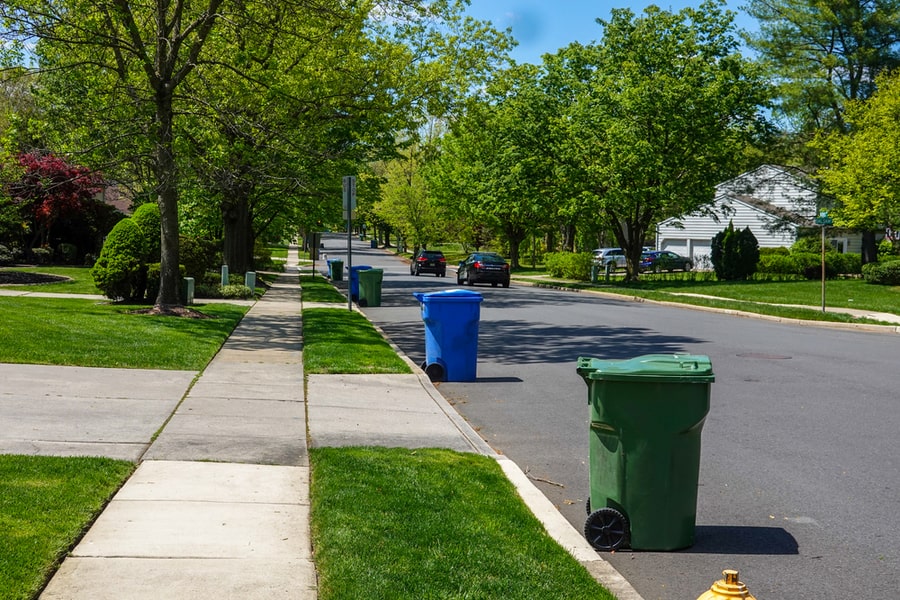
Leftovers and various kinds of litter around the house will attract wasps.
If you want to keep them away, use a dumpster or air-tight trash can to manage your trash.
It doesn’t end there. You would also need to wash the interior and exterior parts of the dumpster/trash can because some dirt can spill.
4. Use Citronella
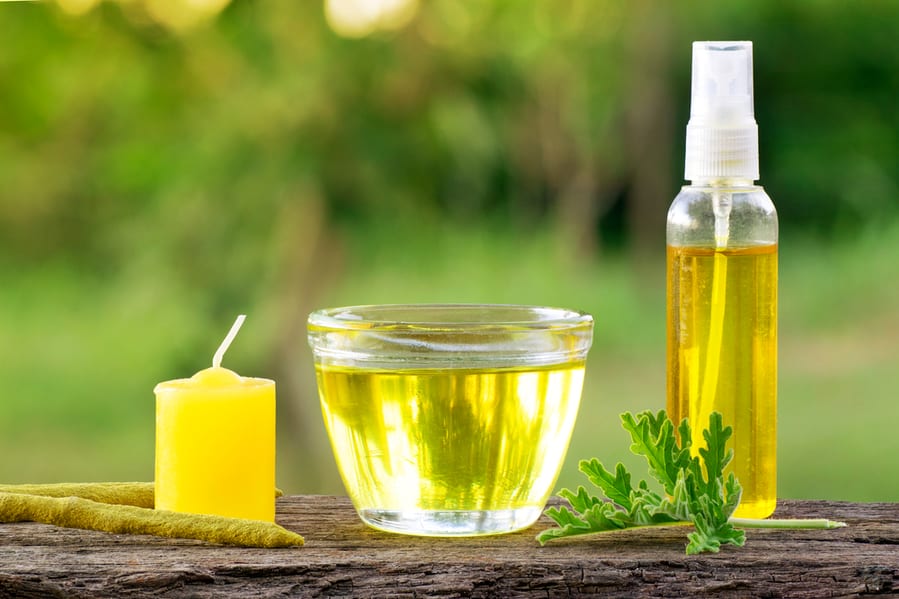
Citronella plants and candles are effective against wasps. Their smell irritates wasps and sends them running.
You can plant Citronella around your yard to ward off these unwanted visitors.
You can also buy citronella candles, light them and keep them around your windows or deck.
While it gives your home a sweet smell, it also deters wasps.
5. Buy Some Wasp Insecticide
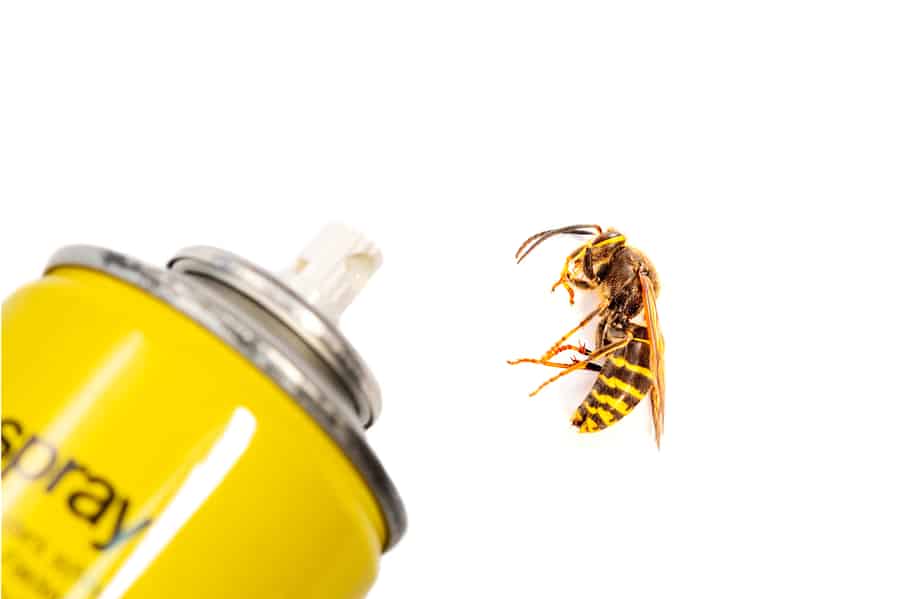
You can buy insecticides to control wasp infestation around your house.
Spray them around your home or in corners where you suspect their activity.
Also, spray the insecticide around their nests to kill them in their numbers. After some time, clear the nest and dead wasps.
6. Set Some Traps
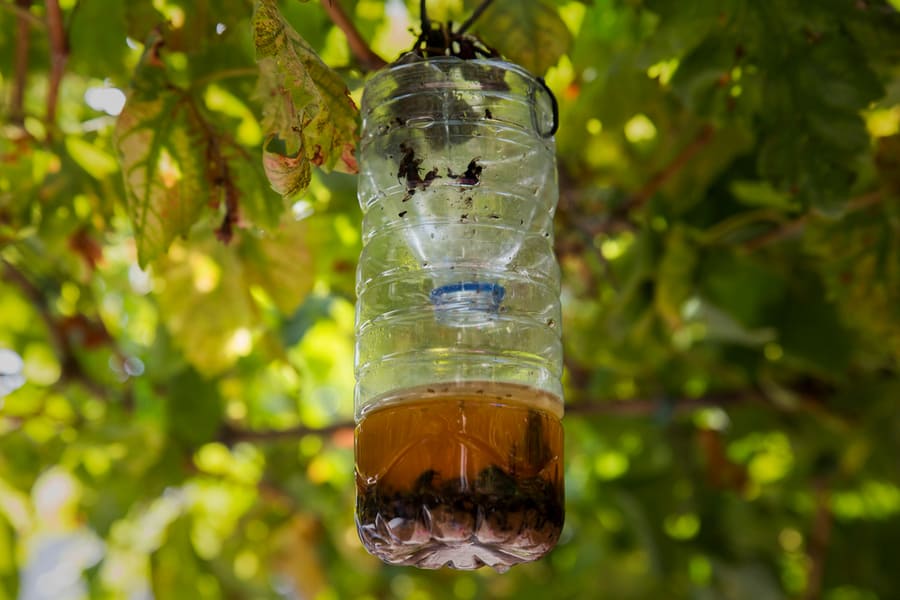
There are common DIY traps you can use to lure and kill wasps. All you need is a plastic bottle, warm water, sugar, and soda. It would be best if you also had a wire to hang the bottle on a tree or deck.
Since light attracts wasps, you can hang the bottle close to a large bulb outside the house. When the wasps come close and try to feed on the sugars, they would fall inside the mixture and drown.
You can check on the trap at intervals and dispose of the dead wasps afterward. If you leave the trap there for a long time, the wasps may notice and avoid it.
7. Seal All Possible Entry Points

This applies to bees and wasps.
Check your home and look for holes, openings, and other points these stubborn insects may enter through.
Bees and wasps are not so giant and can fly through the tiniest space.
You can use caulk or wire mesh to cover up any holes or openings you see.
8. Call an Exterminator
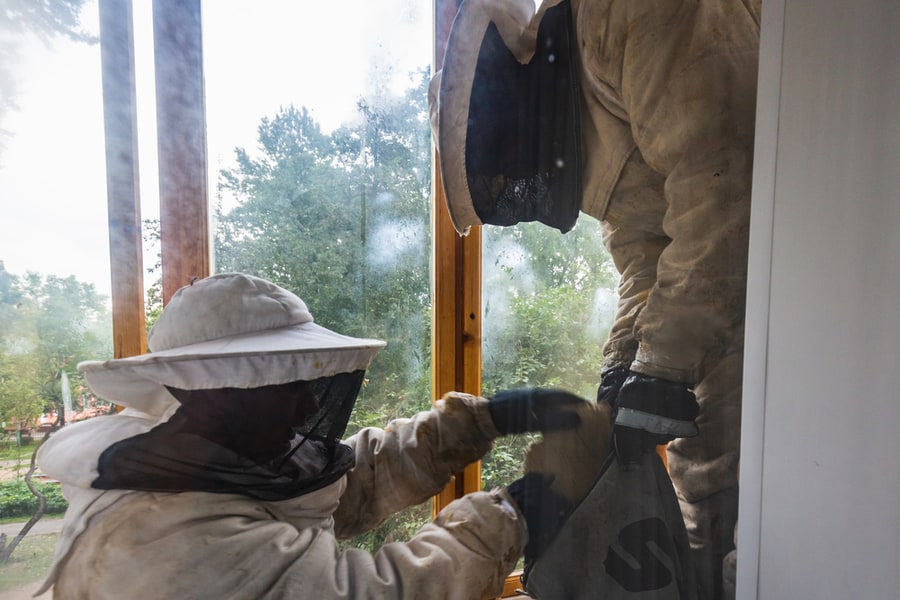
Calling an exterminator or pest control agency to handle bee or wasp infestation is a great option. There is nothing as great as having an expert come around to do their magic.
You may get stung while trying to repel any of these insects and put your health at risk. Besides, you may not even know when to apply certain repellants and when to check back on them.
Imagine trying to rip off a bee/wasp nest, not knowing that many of them are still alive. That would be a tragedy, and you would not want that.
Beyond charging for their services, exterminators are as interested in putting away the insects as you are. They take their time to inspect every corner of the home, look out for nests and carry you along.
Most of them listen to your complaints and advise you without charging a penny. They have every equipment and chemical needed to deter the insects and dispose of the dead ones.
Differences/Similarities Between Bees and Wasps
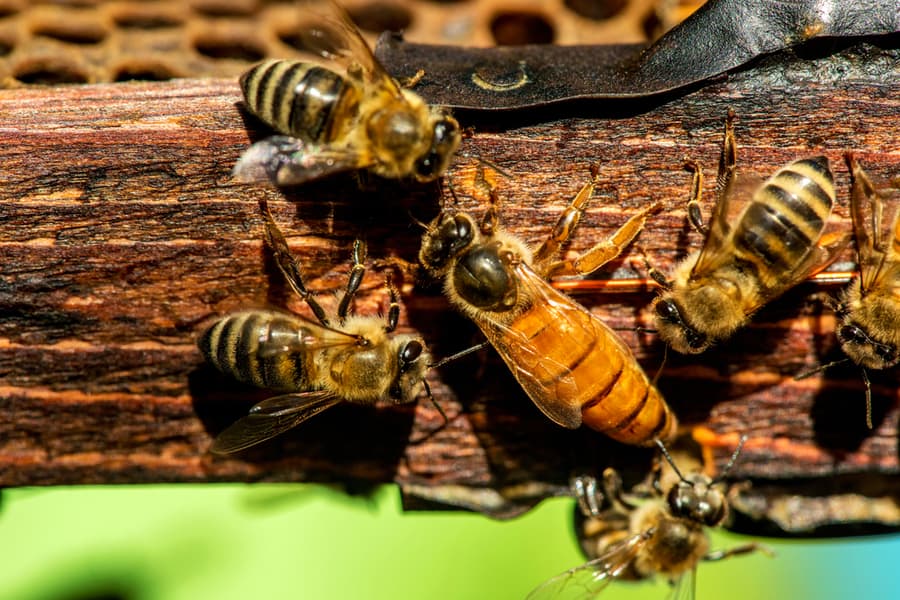
Bees and wasps are similar in so many ways. Hence, it can sometimes be difficult to tell which is invading your space.
We compiled differences and similarities between wasps and bees to avoid mixups while deploying the strategies.
Let’s consider them briefly before we wrap the guide up:
- Wasps and bees share a similar physique as both are from the same family. However, waps do not produce honey.
- Bees are fluffy and fat. On the other hand, wasps are shiny and slim.
- Bees have light-brown and black stripes, while wasps have yellow and black lines.
- Bees feed mainly on plant nectar, while wasps eat sugary foods.
- Bees make their nest/hives from beeswax. Wasps mix saliva with wood particles to make theirs.
- Unlike wasps, bees help in pollination and honey production.
- Both bees and wasps love nectar and live off plants and flowers, but bees do it more. They also love sweet-scenting flowers and fragrances and will hover around your sweets and fruit juice.
- The pair love to protect their colonies and will get mad at the slightest threat. Bees look out for their queen and workers, and wasps look for shelter for their babies.
Experts usually advise against DIY methods in controlling bees and wasps because their defense can cost a life.
Conclusion
Summertime is a season for outdoor activities and fun, but you don’t have to be scared of bees and wasps. While these stinging insects are scary to have around, there is a lot you can do to keep them away.
Above, we provided some practical strategies you can deploy. Depending on which infestation you have at hand, you can grow pest-repellent plants, apply insecticide sprays, or use essential oils.
Remember not to go close to bees and wasps in all your attempts to deter these pests. Even if you are sure you can handle them, it is still safe to stay some distance in applying your deterrent efforts.
These insects can attack in their numbers, and more of them can sting you countless times.
For best results, we recommend applying several deterrent strategies at once. However, in the event of large infestations, call an exterminator urgently.
Frequently Asked Questions
Do Zappers Kill Bees?
Yes, they do. Electric zappers are effective in killing bees on the spot. The lights from the machine attract them, and when they get close, they face electrocution and drop dead.
So, zappers will make another good bee-deterrent strategy to add to your arsenal.
What Should I Do When a Wasp Lands on My Skin?
It will not be easy, but you must stay calm. Stay still till the wasp flies off on its own. Any movement would frighten the wasp, and its response could be a sting.
Can Bees and Wasps Chase Me?
Of course, yes! They will conclude you are a threat if you walk toward them and prepare to attack. It gets worse when you start running because they will feel more agitated and chase you for a long time.

